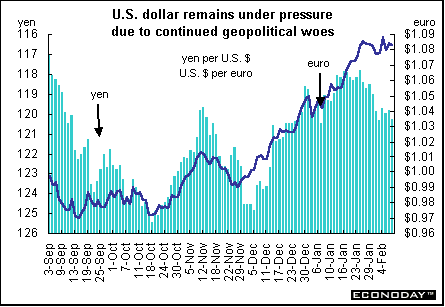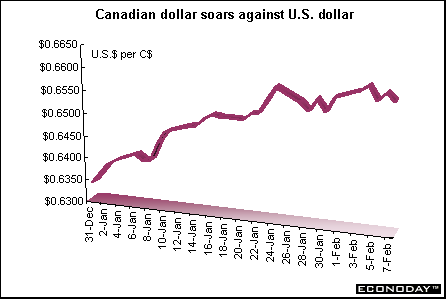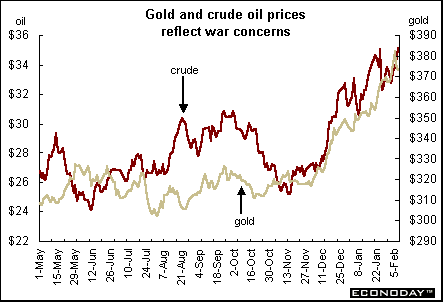 |

Currencies
The beat goes on between the euro and the dollar. The dollar fell against the euro, bringing its loss during the past year to 20 percent, as geopolitical worries continue to weigh heavily on the dollar. The dollar weakened even as it recorded its biggest gain against the euro in five weeks as traders bought dollars as a bet that U.S. Secretary of State Colin Powell's speech to the United Nations would help the U.S. gain further support for a war against Iraq. Most of the cost of financing the war is expected to be borne by the U.S., which is seen as U.S. dollar-negative. The dollar also enjoyed a short-lived spike on Friday as investors cheered unexpectedly strong U.S. employment report. The dollar gave back its gains as the market focus returned to the potential for a war with Iraq and the terror alert, which was lifted to orange from yellow. Few would disagree that risk aversion, characterized at present by uncertainty over the timing of a possible U.S.-led conflict with Iraq, is a key driver of currency market direction. Few disagree either that if the uncertainty is removed by a quick conflict, then risk aversion should normally subside.

The U.S. dollar isn't only struggling against the euro and yen, but other currencies as well. Of note is the strength of the Canadian dollar. With the U.S. economy in the doldrums and geopolitical risks dominating investor sentiment, the strength of Canada's domestic economy and its favorable interest-rate differential with the U.S. have helped the Canadian dollar to gain about 4 percent against its southern counterpart so far this year. At 2.75 percent, Canadian interest rates offer a 1.5 percent premium to the U.S. federal funds rate.

Oil and gold continue their upward moves
Crude oil hit a new two-year high last week as the Bush administration tried to drum up support for an attack on Iraq. The U.S. increased pressure for action against Iraq in the UN as Secretary of State Powell accused Baghdad of hiding weapons of mass destruction. Mr Powell's briefing was followed on Thursday by President Bush saying "the game is over" for Iraqi President Saddam Hussein. Also supporting oil prices were reports that U.S. fuel supplies had fallen steeply amid freezing temperatures. Total U.S. crude stocks are down to their lowest level since 1975 due to a strike in Venezuela, the world's fifth largest oil exporter that supplies 13 percent of U.S. needs. The price rise comes despite assurances from the International Energy Agency (IEA) that it would release reserves if there were a war. The agency said reserves would be made available "swiftly and, if necessary, massively". The IEA's 26-member nations hold large reserves of oil for emergency use in the United States, Europe, Japan and South Korea.

 |


Last Week's Highlights • Global Stock Market Indexes • Recap of Global Markets • Currencies • Indicator Scoreboard

The Bottom Line • Looking Ahead
|
 |